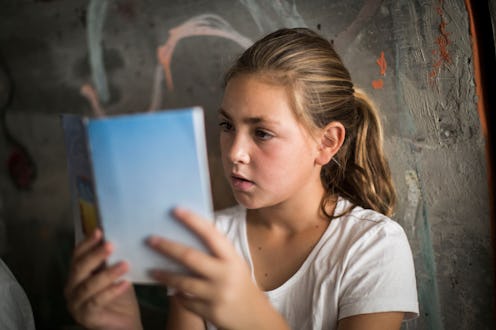Books
Are You Strong Enough to Read These Books Again?
I have LeVar Burton to thank for the first time a book truly unsettled me. Like many kids from my generation, I was a devotee of Reading Rainbow, watching it religiously every day between Sesame Street and my nap. My house was full of books, and every night I was the one begging my mom for "one more story," so a whole half hour dedicated to literature was right up my alley. Give me graham crackers, a juice box and this theme song, and I was set.
Twenty-five years on, the details of the story featured on Reading Rainbow that troubled me so much are fuzzy. I know it involved a pig who left his farm, and ended up in the possession of a cruel, dissolute man who kept him locked in a cage and barely fed him. I don't remember the title. I don't remember the author. I don't remember how it ended.*
What I do remember is the overwhelming feeling of sadness and loneliness that swept over me as I heard the story of this poor little pig's mistreatment. It seemed to settle right in my chest like a cold, heavy weight that I couldn't shake for a long time (or at least what felt like a long time to a little kid. It could have been 20 minutes for all I know.). At any rate, it was a completely new experience for me. I had heard stories my whole, short life and enjoyed them, but this was the first time I realized a book could do much more than entertain me — it could affect me psychologically.
That's the power books have, though, right? They stimulate our imaginations and stir our emotions, sometimes in such a way that our emotions remain slightly off-kilter long after we've put the book down. It's a mark of great writing... but for me, it means that the book ends up in the "read only once" section of my library. These ones have, too:
*Does anyone know which book I'm talking about? Anybody? Bueller?
The Lovely Bones by Alice Sebold
Horror masters like Stephen King and Richard Matheson have nothing on Alice Sebold's haunting 2002 novel told from the perspective of a dead 14-year-old girl who is raped, murdered, and dismembered by a neighbor. It's a masterful story with a unique construct, but Sebold's description of the main character's attack and death is so vivid, it can give you chills just from the mere memory of it.
Beloved by Toni Morrison
Toni Morrison constantly challenges her readers to look at the hard truths of life without flinching, perhaps nowhere more skillfully than her Pulitzer Prize-winner Beloved. Set against the horrors of slavery and the Civil War, Beloved is the rare novel where the presence of a ghost is not the most disturbing event in the story.
Atonement by Ian McEwan
Ian McEwan's 2001 novel is a lyrical literary feast that almost (almost) makes up for one of the most devastating plot twists in contemporary literature. Sure, surprising the readers is something a writer always wants to strive for, but the reveal at the end about the fates of the novel's lovers is heartbreaking. (For the record, the film version is also on my personal list of "films I can only watch once," as well.)
The Road by Cormac McCarthy
Looking for a pick-me-up? Cormac McCarthy's 2006 novel (also a Pulitzer Prize-winner) has it all — bleak post-apocalyptic landscapes, cannibalism, death. I don't care how good a doomsday prepper you are, there is not much you can do to improve a situation like the one portrayed in The Road.
Gone Girl by Gillian Flynn
Readers are still debating Gillian Flynn's 2012 bestselling novel and the subsequent 2014 movie, and I'm still dealing with my ping-ponging emotions, including fear, cynicism and downright contempt. Gone Girl is a clever, complex story that gives the reader a lot to chew on, while making us hesitate to dive back into that dark, twisted world.
American Psycho by Bret Easton Ellis
Still haven't had enough violence, manipulation, and mindf*cks? Bret Easton Ellis's 1991 novel's got them in spades. Read it once, and you'll never be able to pass the suits on Wall Street without your pulse quickening and your head on a swivel.
Trainspotting by Irvine Welsh
"I just read Trainspotting, and heroin sounds really fun," said no one ever. The novel is just as chaotic and unyielding in its look at drug abuse as the 1996 film version (and maybe sequel?), dead babies and all. Like the film, the book sears your brain so that re-reading isn't necessary (unless you need another opportunity to translate the Scottish dialect in which Irvine Welsh writes, in which case, fair enough).
A Clockwork Orange by Anthony Burgess
True, this is another book that may require multiple readings to fully understand and appreciate its language. Then again, the use of slang gives readers something else to focus on when they need a break from the relentless brutality and nihilism in the story. Yes, the world is going to hell in a handcart, and Alex and his droogs are leading the charge.
Marley and Me by John Grogan
Because isn't it traumatic enough to experience a beloved pet dying in real life? Do we really need to go through it over and over in book form?
Infinite Jest by David Foster Wallace
Because if you manage to make it through David Foster Wallace's sprawling, infinitely complex 1996 novel once, go you.
Images: Getty Images; Giphy; Michael Kelleher, Tangolarina, Tobias, Shehan Peruma, Dory Kornfeld/Flickr
